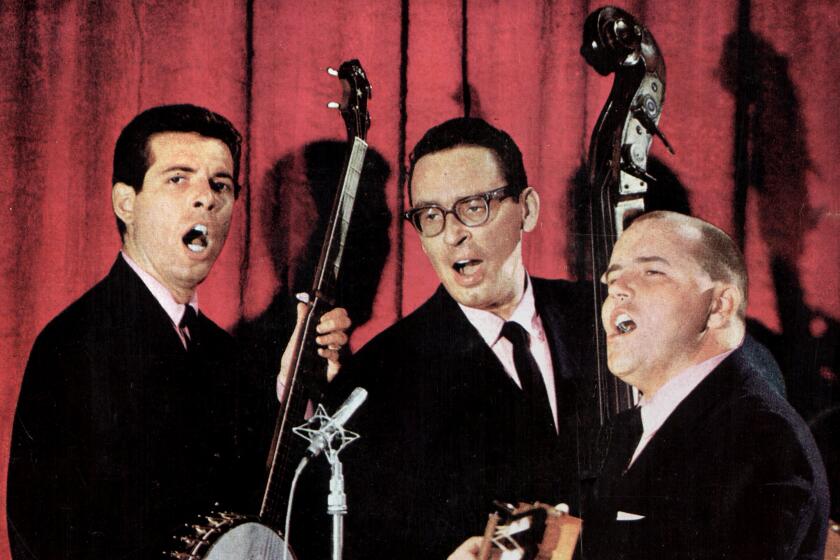‘Joseph P. Kennedy Presents’ by Cari Beauchamp
In the introduction of Cari Beauchamp’s crackling page-turner “Joseph P. Kennedy Presents: His Hollywood Years,” this top-flight film historian declares that the father of JFK “saw everything and everyone, from Gloria Swanson to Adolf Hitler, through a lens of dollars and cents.” Beauchamp demonstrates again and again that, apart from his abiding love and concern for his nine children (and perhaps a few others, including Marion Davies), the bottom line was everything.
“Ruthless” seems truly an inadequate word to describe his dealings with those whom he persuaded to put their complete trust in him only to discard them when their monetary value to him declined. It is not surprising that the families of two former associates, cowboy star Fred Thomson and early business mentor Guy Currier, blame their deaths on Kennedy’s callous abandonment of them.
Kennedy’s five-year Hollywood sojourn, in which Beauchamp discovers breathtaking bravura on Kennedy’s part and lasting impact on the way the film industry operates, is best remembered for his three-year affair with Gloria Swanson, highlighted by their catastrophic decision to make a film with the prodigiously gifted but prodigally wasteful Erich von Stroheim, the aborted “Queen Kelly.” The pre-eminent icon of Hollywood silent-era glamour, Swanson was a spendthrift who turned to Kennedy to help her deal with debts -- only to drop her, leaving her $1.5 million in the hole, partly through some dubious bookkeeping in their company, Gloria Productions. Never mind that he had also spoken to her of love, marriage and children. By the time Kennedy had departed Hollywood in 1931, he was worth at least $15 million and had been declared “the richest Irish American in the world.”
Kennedy was a well-known connoisseur of chorus girls when, in 1914, he married Rose Fitzgerald, daughter of Boston’s colorful John “Honey Fitz” Fitzgerald. Even though they had nine children, the Kennedys lived largely separate lives, and Kennedy pursued many women besides Swanson, including Marlene Dietrich. Hollywood had taught Kennedy, a good-looking, athletic man of dazzling charisma and a virtuoso of public relations, that “It is not what you are that is important but what people think you are that is important” -- an adage he passed on to his sons.
When it suited his purposes, Kennedy asserted that he was born (in 1888) poor though raised in comfortable circumstances and was a Harvard graduate. But he was Boston Irish, and he felt the sting of discrimination that could logically have fed the harshness and brutality accompanying his stunning financial genius. He was utterly determined that his children never experience the social rejections he had.
Kennedy was already well-off from various enterprises and positions when he set his sights on Hollywood. He started modestly with a takeover of the ailing Robertson-Cole Co., then FBO (which became RKO) -- and then Pathé, which occupied the former Thomas Ince Studios in Culver City, and the Keith-Albee-Orpheum theater chain. Beauchamp details his dealings in detail that is dizzying yet accumulatively awe-inspiring. He foolishly overestimated his ability to control Stroheim, was defeated in his attempt to take over First National -- soon to be absorbed by Warner Bros. -- by subsequent Hollywood moguls such as Barney Balaban (who would later block Kennedy’s attempt to take over Paramount), Spyros Skouras and RCA’s David Sarnoff, in whom he met his match. By coming to Hollywood, however, Kennedy proved to be the right man at the right time and place. He took advantage of the chaos created by the sound revolution, anticipated the 1929 market crash and brought a bank president’s acumen to the business of making films. Author Betty Lasky, daughter of pioneer producer Jesse Lasky, told Beauchamp that “Joe Kennedy was the first and only outsider to fleece Hollywood.”
Even though Beauchamp, author of “Without Lying Down: Frances Marion and the Powerful Women of Early Hollywood,” subtitles this book “His Hollywood Years,” she actually chronicles Kennedy’s entire life. Hollywood provided the foundation for Kennedy’s fortune, estimated to be $400 million at the time of his death in 1969. And, as Beauchamp asserts convincingly, his adventures in the film industry were enduringly influential and taught him how to present himself in the ways he wanted to be seen.
Kennedy next concentrated on Washington, hoping President Roosevelt would give him a seat on his Cabinet, but he instead wound up as head of the newly formed Securities and Exchange Commission. FDR was wary of Kennedy, yet named him ambassador to the United Kingdom in 1938, which marked a grand social triumph for him and his family. But he proved to be an outspoken isolationist and “far from a natural diplomat.” He dreamed and schemed of running for president in 1940, but his hopes were dashed when Roosevelt was nominated for an unprecedented third term. Joseph Kennedy would witness the tragic deaths of three sons and suffer a stroke, in late 1961, that left him helpless and speechless until his death eight years later.
Thomas reviews movies for The Times.
More to Read
The biggest entertainment stories
Get our big stories about Hollywood, film, television, music, arts, culture and more right in your inbox as soon as they publish.
You may occasionally receive promotional content from the Los Angeles Times.






